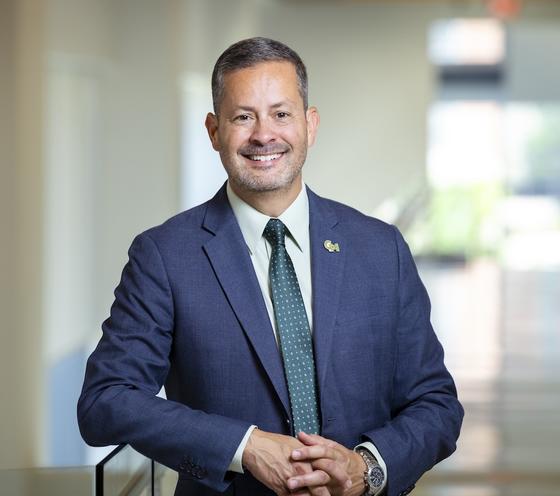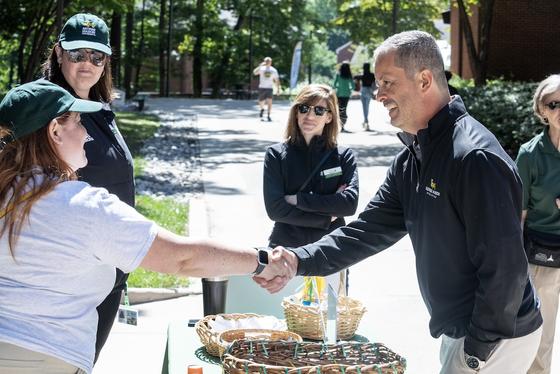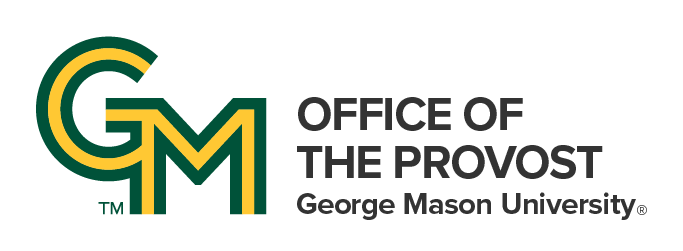James Antony became provost and executive vice president at George Mason University on July 1. He comes to George Mason from the University of California San Diego where he served as Dean of Graduate Education and Postdoctoral Affairs. Prior to that he was a faculty member and administrator at the University of Washington, Yale University, and Harvard University.
What attracted you to George Mason?

I wanted to be at an institution that was developing the potential of the people who they were accepting and taking them to heights that maybe they, and others around them, might not have thought possible. George Mason, to me, fit that bill. We accept on the order of the 90 percent of the undergraduates who apply and, unlike other places that have a similar broad-access orientation, our students graduate at a very high rate. George Mason’s admissions process attracts amazing students without being exclusionary—we open opportunities here. We also do incredible work with our graduate and professional students. Overall, this place is very student centered.
There's a whole host of things that I'm learning now that reinforces my decision to come here as being a good one. The faculty I've met are incredibly student-oriented. They care about teaching and about what they're doing in the classroom. They care about the kinds of experiences they're constructing for our students. And, they care about doing all that while continuing to elevate this place as a research university—you might not find that same balance at other places. So, I keep finding more and more evidence that coming here was a great choice.
What are you looking to do in your first year?
I think there's nothing more important right now for a new provost than to come in and just hear the perspectives of faculty, of various kinds of leaders, to understand what's going on with our staff, to learn about our students, and to appreciate the cultures and the histories that embody this place. Over time, this listening will enable me to develop an agenda in terms of strategy and goals. I'm reading everything I can, and interrogating my own thinking about everything I believe I am learning so I can have what I hope are smart questions for folks when I ask them to explain things to me.
You were a first-generation college student, as are many George Mason students. How does that affect how you carry out your role?
The hallmark of my own first-gen experience was not really understanding how things worked. I was a slow starter, and it took me a lot of time to really learn how to navigate the university’s culture. At the same time, given my background, I knew how to be resilient in many ways. And I think this is true for many of our students here, as well. My sense is that first-gen students know how to get stuff done. A first-generation college student is somebody who has figured out how to navigate life’s complexities, and still get to our university’s doorstep. They are not coming here lacking in abilities or resourcefulness. Sure, they may not have family members or others in their immediate sphere who know how to help them navigate the university. And, they may lack financial resources. But in terms of personal commitment, smarts, and what we might call a “can-do” attitude, they're not lacking. Even so, we shouldn’t assume that they will readily navigate our institution in a seamless fashion. We have to make sure we create an educational environment that is supportive, and that allows them to reach their full potential.
One of President Gregory Washington’s goals is greater emphasis on grand challenge issues. How are George Mason faculty positioned for impact?
The George Mason faculty are positioned to have impact on grand challenges because they've already been having impact in ways that prepare us, as a university, to think about addressing big ideas. This is one of the youngest rising research universities in the country. This faculty as a collective has been steadily building its prominence as a research-based faculty with, frankly, a fraction of the resources that other universities enjoy. They are definitely getting noticed all over the country for the impact they're already having.

What if, while supporting them to do the work they are already excelling at, we were also able to strategically align our incredibly creative people around a set of issues that most could agree are so compelling that they will define the human condition for not just the next five or 10 years, but for generations to come? To me, that is the kind of question the framework of a grand challenge allows us to ask. It gives everybody a possible compass to direct some of what we do. It's not saying we only do the grand challenges—we still do the broad scholarship and creative work that represents the larger array of our interests. But, when possible, let’s imagine enabling the alignment of some of our folks’ work to tackle challenges that are bigger than George Mason.
What are your views on artificial intelligence (AI) in higher education, and why is it important for George Mason graduates to be fluent in AI?
Research into artificial intelligence can provide opportunities for our scholars to define the future of AI, independent of its application. I’m talking about basic research that helps us understand AI and helps us shape AI and its associated technologies and possibilities. There are so many questions of a technical nature. But there are also questions of application and impact, not the least of which all-important considerations of the ethics and moralities around AI. I am excited by the possibilities of pure scholarship in all these areas, enabling our talented faculty and students to study AI in all of its instantiations and to do really good work helping society understand, and use, AI.
Another opportunity is for our university to figure out where partnerships might exist with industry. We obviously have to think about partnerships that make sense, where the university can leverage its expertise to bring something to bear that advances scholarship, the development of our students, and service to humanity. But we may also be able to learn from the way in which industry is approaching this work. And we can certainly explore creating partnership opportunities and programs that benefit our students and faculty. We have an ethical obligation to teach our students about all this, and we have many exciting opportunities to explore with a variety of partners. The good news is that we are fortunate to have many smart, super talented, people at George Mason who are leaders in this work. As provost, my job is to enable such people.
One of your many areas of expertise is graduate education. Any particular plans or thoughts about here at George Mason?
A world-class research university has thriving programs at the master's and doctoral levels, as well as professional degree programs that are top-notch. Graduate and professional education is something that, when done really well, provides an outcome to the student who's pursuing the advanced degree, but also provides faculty an additional dimension to do their core creative and scholarly work. Special things happen in an intellectual space that brings faculty and graduate or professional students into collaboration with one another. But there's also an impact on society. We need to make sure that we are putting together a robust array of graduate and professional programs that not only advance scholarship, but also have impact on the lives of the average person out there. Those with advanced graduate or professional degrees, like the students we are training at George Mason, go on to have positive impacts on the daily lives of every person in our broader community. As provost, I will work with faculty and other leaders to think about what a vibrant future for graduate and professional education looks like for the George Mason of the future.
You’ve referred to George Mason being one of the most compelling institutions in the nation. How so?
What I see for George Mason is a future that will be positively stunning. We've got so much talent and potential that, on those dimensions, it will be hard to limit our possibilities. But, like many large public research universities, we will have to be strategic and creative when thinking about our future. The good news is we have a lot going for us. Our campus locations are ripe for development, and for becoming the kinds of built environments that, generations from now, will be leaps beyond what our founders could have imagined when we first opened as a university.
We are in one of the most compelling economic environments in the nation, not to mention within proximity to the nation’s capital—we have to continue building upon our successes leveraging our location.
At George Mason, we get to construct our own future. It's going to require lots of discussion, planning, and strategic thinking. It’s going to be a lot of work, and we will have to be bold. But I am so excited about being somewhere that has that kind of potential. For me, I like being in a place where the very best days lie ahead. I look forward to working with everyone to shape that amazing future.
Did you know...
The Office of the Provost has primary responsibility for George Mason's academic mission, including supporting scholarly excellence among faculty members and fostering academic success for students on all four campuses.
Related News
- February 2, 2026
- January 28, 2026
- January 27, 2026
- January 26, 2026
- January 16, 2026
